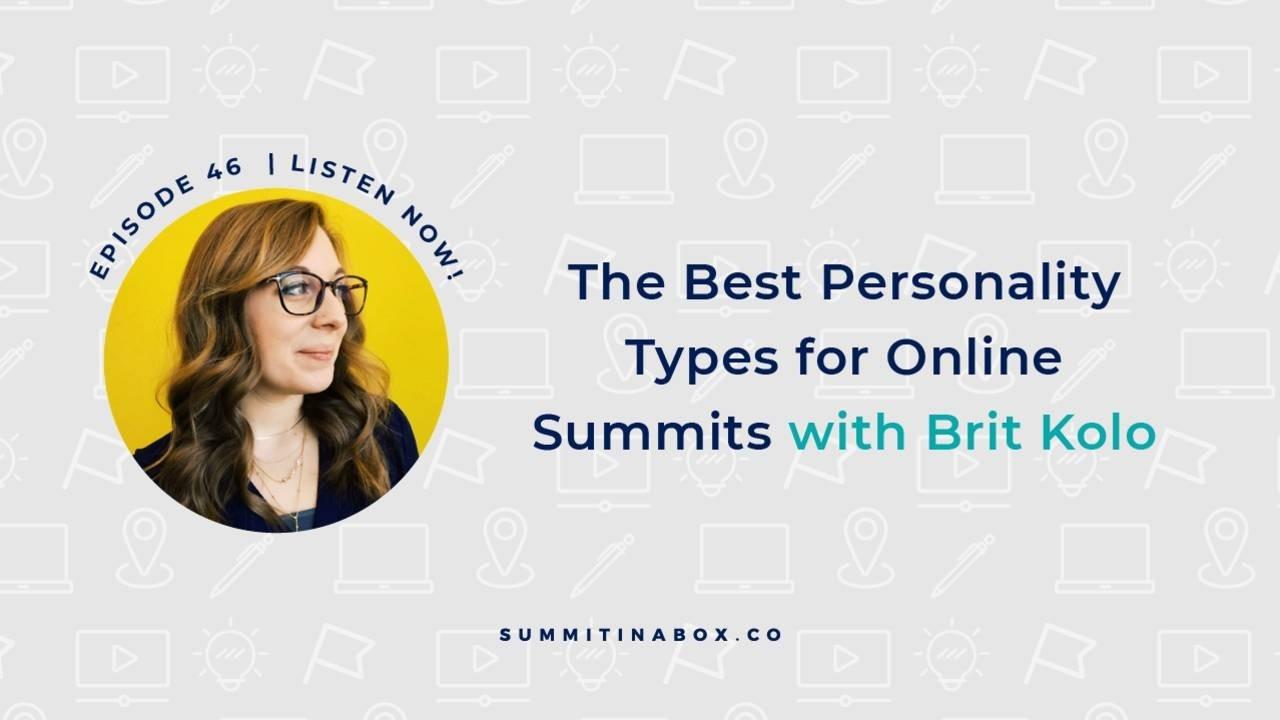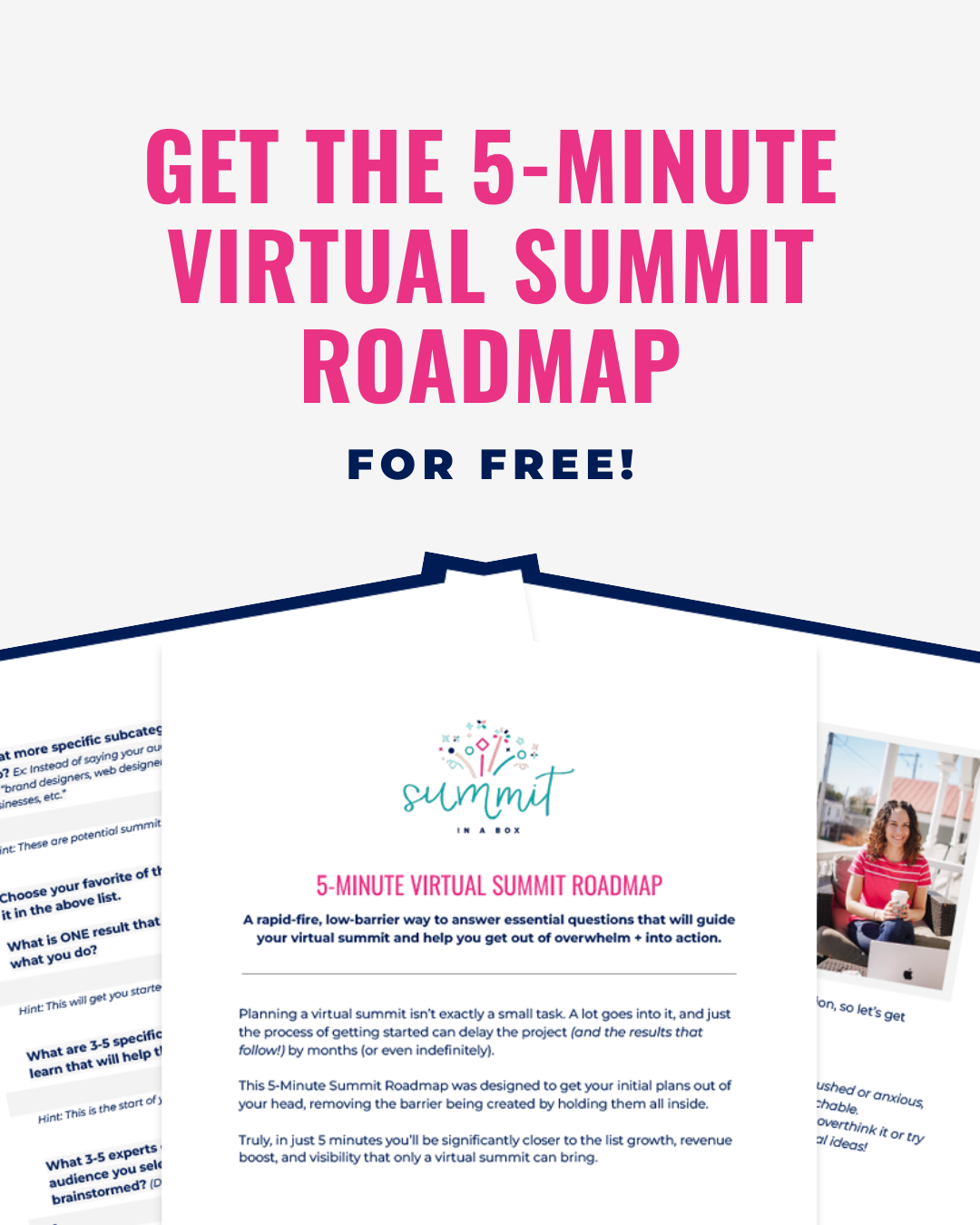The Best Personality Types for Virtual Summits with Brit Kolo


In this episode with Brit Kolo, we're chatting about the personality types best fit for hosting a summit.
We'll cover:
- an overview of the personality types
- which personality types will have the easiest time hosting a summit
- what to do if you are more cut out for either the planning or hosting stage
I'll let Brit take it from here!
Figure out your personality type
There are plenty of assessments out there to tell you about yourself. My marketing personality type framework is based on the Myers–Briggs Type Indicator. That's what I would call the gold standard of personality type assessments. It's been used for many decades and most people recognize the name.
The letters represent preferences within the natural way you show up in the world. It's not a perfect science. It's called an indicator for a reason.
What it essentially does is it holds up a mirror in front of you to reflect back on things about yourself that you already know, but you couldn't necessarily put your finger on.
Once you get to see that and it's reflected back to you, you become more self-aware. You're able to speak about yourself a little bit differently, a little bit more accurately. Then the fun part happens where we get to take what we know about you, what feels good to you, what's natural to you, and apply it to fun things like marketing.
Overview of the different personality types
There are 16 personality types. Each personality type has those four letters, but they represent preferences. To give you an idea, my personality type’s ENFJ and Krista’s ISFJ.
I highly recommend taking the assessment at 16personalities.com. It's a free assessment. I don't own that site. I have no affiliation with that site, but I just really love how they have their assessment built out and the results that they give you once you do take the assessment are so well done.
We have those four letters, those four preferences, and those get to tell us a lot about who we naturally are. There are 16 combinations of these letters. I'll run through what each of the letters stands for so you can kind of get a very high-level layman's term view of what these are.
Your First Letter: I or E
Your first letter is either an I or an E. I stands for introvert, E stands for extrovert.
There's a lot of misconceptions about these two preferences. What you need to know about these two is that it's all about how sensitive you are to external stimuli.
- Introverts are more sensitive to external stimuli, withdraw, and don't like to be externally stimulated.
- Extroverts are not as sensitive to external stimuli, and tend to seek out those stimuli to get them energized.
Your Second Letter: S or N
Then, the second letter is either an S or an N. S stands for observant. N stands for intuitive. This is all about where you like to pay attention.
- Intuitive people prefer to pay attention to internal cues.
- Observant sensing people prefer to pay attention to external cues, their surroundings rather than what's going on inside of them, their emotions, their thoughts, their feelings.
Your Third Letter: T or F
Now, the third letter is either a T or an F. T stands for thinking and F stands for feeling. This is all about where you prefer to make your decisions from.
- Thinkers prefer to make their decisions from their thoughts, data, history, what they can really put their finger on and put into a spreadsheet.
- Feelers prefer to make decisions based on what they're feeling. It might not make sense on a spreadsheet or logistically, so they still want to make that decision based on what they're feeling.
Your Fourth Letter: J or P
Then finally, the fourth letter is either a J or a P. J stands for judging and P stands for perceiving. This is all about how and where you see clear or unclear boundaries.
- Judgers aren’t judgmental, they're discerning and tend to see clear boundaries and more black and white. Because of that, when they look out at the world, they can make decisions a bit quicker. They tend to be a bit quicker to decide.
- Perceivers tend to prefer to stay more open and flexible. They look out at the world, and they really see more gray areas and not defined boundaries and lines. Because of that, they don't make decisions as quickly.
Those are the 8 preferences and between those I and E and N and S and so forth, you can probably already start self-identifying with what feels right for you, and then you can verify that by taking the assessment.
Personality types and virtual summits
From my perspective, I believe that there are some personality types that are going to enjoy the building of the summit and the hosting of the summit more so than others.
Good at Building AND Hosting a Summit
ISFJs, ESTJs, and ESFJs are all in the sentinel tribe. I can see them loving both the setup and hosting of the summit. They are very organized, process and system-driven people. But you're also always thinking about not your end result, but more so about the person on the other side of the screen.
With those two things put together, I think that that's a perfect opportunity for you.
Good at Building OR Hosting a summit
I can see any of our more technical, logical thinkers like INTJs, INTPs, ISTJs. Those people are more introverted, more thinking, logic-based. They're going to be just fine at setting up the backend stuff. They're going to do great at that, but maybe not so excited about the hosting and the being out there, putting their face out there, being really super excited all week long.
If they wanted to host a summit, I would recommend a co-hosted summit, or if you're lucky enough to have a business partner that wants to do this with you and happens to be a really great host.
Those types are ENTJs, ENFPs, ESFPs, ESFJs. Those types tend to be really out there, face out there, really vibrant, will get on video, be the face, be the host of it while you can kind of like lean back and just do the backend stuff and all the techie stuff.
For the different types I haven't really said, it's not necessarily that summits are the worst possible thing you could do, it might just not be the best. Really think about how you can make it feel good for you. If you can’t find a way to do that, maybe find something else.
Brit’s biggest takeaway
Yes, you can apply this to summits, but let's just apply it to your entire marketing strategy. This has to feel good for it to work. What you put out; you get back.
When you show up feeling good, your audience will feel good too.
About Brit

Find Your Marketing Personality Type | Follow Brit on Instagram


